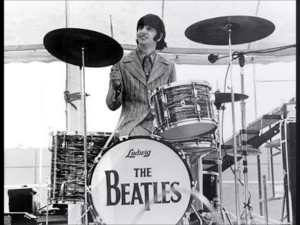 As rock ‘n’ roll evolved into Rock in the later Sixties, there arose a distinct category of bands, the “Superstar Bands” in which each individual member was a so-called superstar instrumentalist (Cream, Blind Faith, Led Zeppelin, for example). During that period it became rather popular to say that The Beatles and that Ringo in particular were lesser musicians because they did not engage in the instrumental heroics of an Eric Clapton, a Jack Bruce, a Ginger Baker.
As rock ‘n’ roll evolved into Rock in the later Sixties, there arose a distinct category of bands, the “Superstar Bands” in which each individual member was a so-called superstar instrumentalist (Cream, Blind Faith, Led Zeppelin, for example). During that period it became rather popular to say that The Beatles and that Ringo in particular were lesser musicians because they did not engage in the instrumental heroics of an Eric Clapton, a Jack Bruce, a Ginger Baker.
Such criticism, of course, ignored the fact that The Beatles represented a pre-guitar-hero ideal — an ideal in which all the elements of a musical arrangement — the guitar rhythms & riffs, the vocal harmonies, the bass lines, and the drum fills — were all intended to support the Main Thing, the song itself, rather than the song serving as a vehicle to highlight one particular instrumentalist in the band.
One of the reasons The Beatles’ music remains so popular is because aside from a few instances in which they purposely sought to show they could compete with the guitar-hero bands — most of those particular songs, incidentally, can be found on the “White” album — they kept their focus on The Song. And even in those cases where they threw everything but the kitchen sink into the arrangement and production (as in most of the songs from “Sgt. Pepper”), they still maintained a song-centric orientation.
All these years later, most musicians and critics have laughed off the earlier criticisms as having been silly in the first place. Both Paul McCartney and George Harrison have been acknowledged as excellent individual musicians and players. And though John Lennon was often a somewhat ham-fisted guitarist and pianist, his lack of theoretical knowledge and skills are seen as key to some of the wildly creative chord progressions and quirky time signatures that marked some of his best songs.
But though The Beatles ensemble playing was excellent and is rarely doubted, the criticisms of Ringo still persist from time to time. “Simplistic” is often the term applied.
It’s a criticism that overlooks much about Ringo’s skills. For one, he was as steady a drummer as ever found in rock. Most drummers have a tendency to speed up or slow down during a song (which is why most bands employ a synthesized “click track” to keep time when recording), but not Ringo. Further, he absolutely understood his role in the band — to support the brilliant songs The Beatles performed. Frankly, he hated the idea of drum solos, feeling that they detracted from whatever song was being performed.
Beyond that, Ringo’s drumming was absolutely essential to the sound of The Beatles. It’s distinctive, and his fills (when he played them) have character.
But let’s allow Ian MacDonald to speak on behalf of a couple of Ringo’s contributions. MacDonald’s book, Revolution in the Head (Henry Holt & Co., 1994) is a musical analysis of every single song The Beatles recorded and is considered THE definitive musical commentary on the recordings of The Beatles:
From The Beatles early years: “The contribution of Ringo Starr and George Harrison to “She Loves You” demonstrates the groups’s acute cohesion. The drums on the chorus, which begin the song, are intrinsic to the track’s dynamics, creating tension by replacing the offbeat with tom-tom quavers before blazing into the thrashed open hi-hat of Starr’s classic Beatlemania style.”
From The Beatles peak years: “Instrumentally, the twin focuses of “Rain” are Starr’s superb soloistic drumming and McCartney’s high-register bass line.”
I would add another example from Abbey Road: Ringo’s only recorded drum solo, an 8-measure solo featured in “The End” — played primarily on bass drum and tom-toms, and performed only reluctantly because he hated solos — is one of the most distinct and recognizable drum solos in rock history.
And as someone who played with many drummers for over 40 years, I would also add that I have been frequently surprised at how many very accomplished ones have found it difficult to play the supposedly “simple” Ringo Beat. Maybe, just maybe it’s harder than it looks.
It’s true that Ringo wasn’t particularly flashy, but in an era and in a band in which a drummer was absolutely depended on to keep the beat AND support the rest of the band — the greatest pop band, ever, by the way — he was THE drummer’s drummer whose style was essential to The Beatles musical identity and remains as immediately recognizable as any flashier drummers before or after.
– Rich Horton, July, 2015
Here’s another excellent article: Ringo’s no joke. He was a genius and the Beatles were lucky to have him, by James Woodall – On the eve of his 75th birthday, it’s time to celebrate the musical contribution Ringo Starr made to the Fab Four


